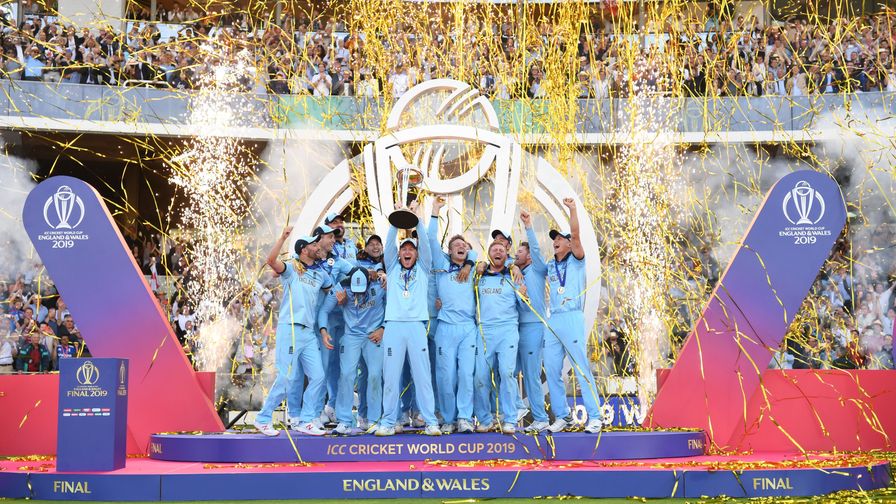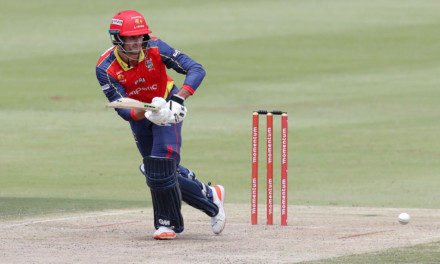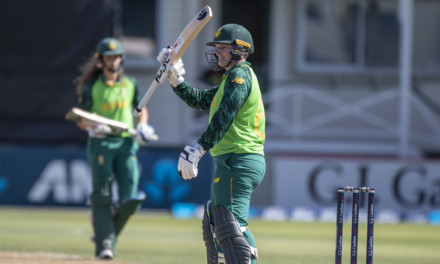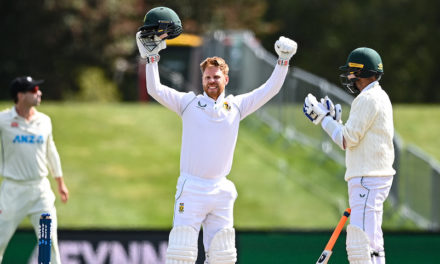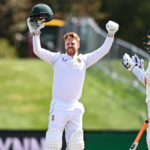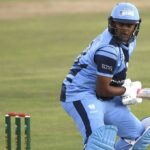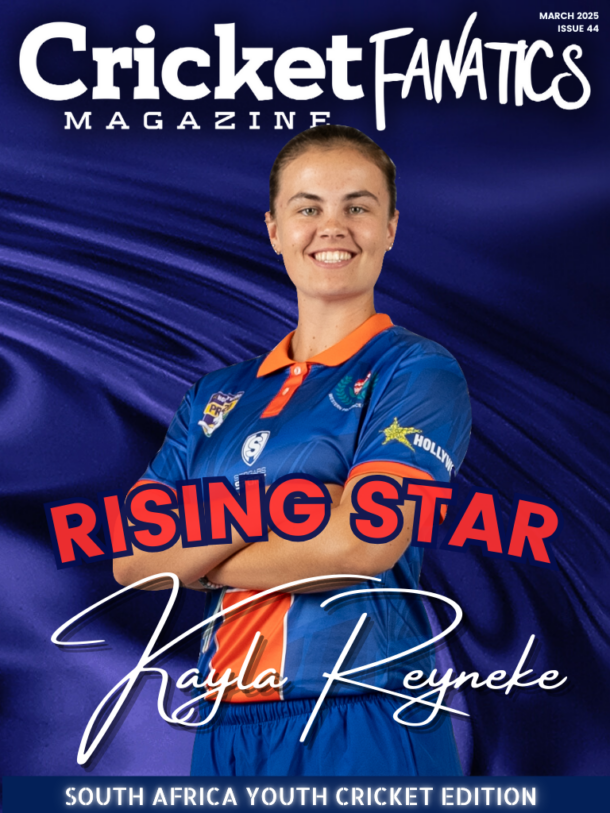I am not suggesting for one second that you blindly support every single decision that South Africa makes over the course of the next 3/4 years but as fans, it is our responsibility to support our respective teams through both thick and thin, writes Aaron Viles.
It’s 7.35 pm on Sunday 14th July 2019.
England have just won the ICC Cricket World Cup by the “barest of margins” in one of the most extraordinary affairs in cricketing history.
Somewhere in the picturesque countryside of rural Warwickshire, a diehard Cricket Fanatic who had endured years of hurt at the hands of his beloved Three Lions is sprinting down his driveway with a Warwickshire flag waving in his arms, fluttering ever majestically in the refreshing evening breeze on the best day of his life to date.
Sounds almost poetic when I put it like that doesn’t it?
In order to fully understand the sheer magnitude of this moment to English cricket fans however you first have to transport yourself back four years in time to a much darker period in which no England fan, myself very much included, believed that our team would ever reach the knockout stages of an ICC World Cup let alone go on to win the tournament as a whole within the same decade.
It’s the 13th February 2015, an ICC Cricket World Cup is right around the corner and a woefully out-of-form England team captained by Eoin Morgan are preparing for their tournament opener against co-hosts Australia at the mighty MCG.
Just 24 hours later, that same England team are left licking their wounds after an embarrassing 111-run annihilation at the hands of our oldest foe.
Oh well, these things happen in cricket I suppose, surely it can only get better from here?
Oh no mate, this nightmare has only just begun so strap yourself in, make yourself comfortable and prepare for a string of performances so disastrous that you may begin to question your very love for this game in a way you never thought imaginable.
In the next game, England were bowled out for 123 runs by co-hosts New Zealand in Wellington. Tim Southee takes 7/33. Brendon McCullum and the Blackcaps take just 12.2 overs to complete their run chase. English cricket takes another step towards the proverbial cricketing abyss.
Unsurprisingly our 2015 World Cup campaign never fully recovered from those two humiliations at the hands of the tournament hosts and by 9th March, our aspirations of World Cup glory came tumbling down once and for all at the hands of a Rubel Hossain yorker which sent the Three Lions packing with a group stage game to spare.
For the weeks that followed that fateful tournament, I can honestly say that I was rather embarrassed to call myself an English cricket fan.
The team lacked basic camaraderie, the brand of cricket that we played was antique and quite simply unfit for the fast-paced, dynamic nature of the modern game and there was an air of hopelessness within the English cricket community that I had never experienced up until that point.
We had hit rock bottom.
Things needed to change.
After the embarrassment of the failed 2015 World Cup campaign England had two options ahead of them; take the easy route and alter their style of play in order to mimic the successful approaches of other nations or alternatively take the harder route and completely transform the approach and perception of white-ball cricket in this country.
Fortunately for myself and English cricket fans across the globe, the ECB chose the latter and well, the rest was history.
From the ashes arose a phoenix the likes of which the cricketing world had arguably never seen.
A team full to the very brim with fight and character, a team with an unparalleled ability to rack up 400+ run totals with nonchalant ease and a team spearheaded by one of the nation’s finest ever white ball cricketers with a point to prove, Eoin Joseph Gerrard Morgan.
Morgan’s contribution to the revamp of English cricket during this period simply cannot be understated.
Along with the likes of Ed Smith, Andrew Strauss and Ashley Giles captain Morgan completely re-invigorated the English white-ball landscape, adopting a brand of fearless, exciting and entertaining cricket that would set the Three Lions aside from every other team on the international stage and win back the hearts of the legions of fans who had been so bitterly let down in 2015.
In addition to his contributions away from the pitch Morgan also happened to be the very personification of a natural-born leader on it and under his calm, assured leadership the national team jumped from 6th place in the 2015 ICC ODI rankings to 1st place in the 2018 rankings.
The wheels of revolution were now well and truly in motion.
Fast forward to 2019 and after 4 years of setting the ODI stage alight in various bilateral series across the world that revolution was complete.
England were crowned as the World Champions in front of a packed house at the very home of cricket itself and from the streets of Sheffield to the village greens of Ventnor an entire nation rejoiced as one.
The embarrassment of 2015 was finally behind us once and for all, suddenly the pain of the past seemed irrelevant.
The impossible finally became possible.
And this is where South African cricket comes into the picture.
In many ways, the current Proteas side bears some similarities to the England side of 2014/15 in terms of the identity crisis that the team appears to be suffering from and the apparent sense of hopelessness that looms over the heads of cricket lovers across the rainbow nation as the team struggles to overturn their poor recent form in the white-ball arena. But the most important thing for Proteas fans to maintain right now is their sense of belief.
When English cricket hit rock bottom in 2015, to be honest, I felt a similar sense of hopelessness but it was the unrequited love of the team that I had been supporting so fanatically since 2009 that kept me believing.
There were bumps in the road along the way don’t get me wrong, the 2016 World Cup Final immediately springs to mind in that regard and thanks to the legendary Ian Bishop I don’t think that I will ever forget the name ‘Carlos Brathwaite’ for the remainder of my days, but the core belief still remained even through this disappointment.
Granted Cricket South Africa hasn’t exactly been as proactive as the ECB in its’ approach to ODI or T20I cricket recently but the beauty of South African cricket is that there always appears to be an embarrassment of riches within the domestic talent pool from which the selectors can delve into and if these players are afforded the chance to prove themselves on the international stage with an extended run in the team. The long term benefits may be apparent for all to see in the coming years.
Talking of those players, the likes of Kyle Verreynne and Janneman Malan appear to be destined for greatness given their mightily impressive starts to their respective Proteas careers but they too will have to face their own adversities in the coming years and when those tough times arrive these guys will need the full support of their faithful fans in order to pick themselves back up again.
And that is one of the key lessons to learn from the English white-ball revolution.
Throughout the course of the many ups and downs of those 4 extraordinary years between 2015 and 2019, one thing remained consistent and that was the unwavering support of England fans who fully believed in the process taking place even if the team was going to face adversity along the way.
I am not suggesting for one second that you blindly support every single decision that South Africa makes over the course of the next 3/4 years but as fans, it is our responsibility to support our respective teams through both thick and thin and as long as Proteas fans can maintain that quiet sense of optimism I have absolutely no doubt that the team will one day repay that faith with ICC World Cup glory.
And when that day comes, I sincerely hope that Proteas fans across the rainbow nation can also experience the same sense of pure elation that we felt on that fateful Sunday evening at Lord’s.

